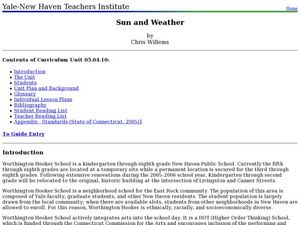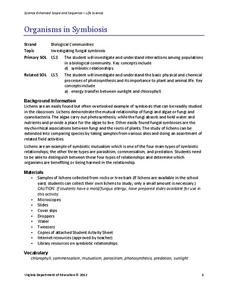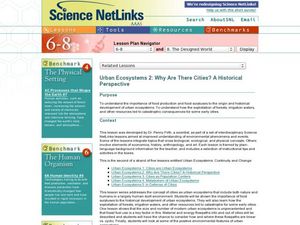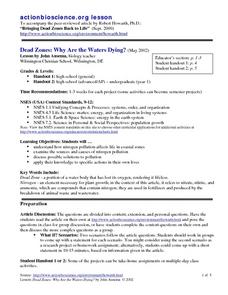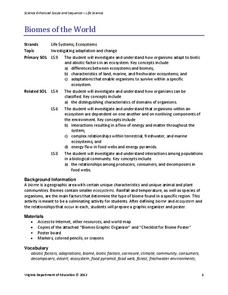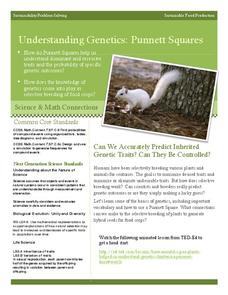Curated OER
Antibiotic Resistance
Students conduct an experiment to examine the effects of six different antibiotics on two different types of bacteria. They monitor Petri dishes with bacterial cultures and antibiotic soaked disks. They relate the bacteria growth...
Curated OER
Sun and Weather
How is the Earth's weather created? Middle schoolers will explain how the Sun's energy is transformed into different forms. They will perform mathematical calculations of volume, mass, and temperature. They they will explain the...
Virginia Department of Education
Organisms in Symbiosis
Searching for an activity that allows emerging biologists to explore symbiosis up close and personal? Pupils collect samples and view lichens through a microscope and conclude with a discussion about the relationship they have with other...
Virginia Department of Education
Changes in Ecosystems
How does water pollution affect the environment? Provide your class with the resources to answer this question as they learn about eutrophication and ecosystem changes. Over two weeks, they simulate the effects of pollution on the...
Global Oneness Project
Ancient and Modern Worlds
The old aphorism, "The road to Hell is paved with good intentions," might well serve as the title for a resource that asks viewers to consider the plight of the people of the Gamo Highlands, an area in southwestern Ethiopia. These...
Channel Islands Film
Human Impact on the Food Web of Santa Cruz Island
What happens when a non-native species is introduced onto an island? Santa Cruz Island, part of the Channel Island chain located off the coast of southern California, provides the perfect laboratory for young environmental scientists to...
Kenan Fellows
The Little Stuff Can Make a Big Difference
Great things come in small packages! What better way to illustrate this point than a week-long look at nanotechnology? Earth science scholars explore water quality issues through lab activities, then research new innovations in nanotech...
Curated OER
Urban Ecosystems 4: Metabolism of Urban Ecosystems
Students discover that material and energy uses by a city come from outside the city boundaries. They realize that the pathway of these material is linear instead of cyclical as they are in natural ecosystems.
Curated OER
Urban Ecosystems 2: Why Are There Cities? A Historical Perspective
Students investigate the importance of food surpluses to the historical development of urban ecosystems.
Curated OER
Dead Zones: Why Are the Waters Dying?
Learners investigate the effects of pollution on marine ecosystems. They read and discuss an article, identify the effects of pollution on marine life, conduct research on local nutrient pollution, and conduct local water quality studies.
Curated OER
Biodiversity Activity
Young scholars are introduced to biodiversiy. They use a simulation of two forests, one planted with only Douglas Fir trees, and one with diverse species of trees. Students also use the simulation of two forests, one a monoculture of...
Curated OER
Evaluating the Strength of Scientific Evidence: The Rediscovery of the Ivory-billed Woodpecker
A happy discovery occurred in Arkansas in 2004: a woodpecker, believed to be extinct since the 1940s, reappeared! Or did it? Middle to high school ecologists examine scientific evidence and use critical-thinking skills to determine...
Curated OER
Blue Crabs - The Blue Crab's Chesapeake Journey
A plethora of information about the blue crabs of Chesapeake Bay will amaze and delight your marine biologists. They learn, through direct instruction, about the characteristics and life cycle of this fascinating arthropod. A highlight...
National Center for Case Study Teaching in Science
In Sickness and in Health
Based on family history, how likely is it that a couple's children will have a recessive disease? In an in-depth, but easy-to-follow case study, future geneticists learn the story of Greg and Olga, who are hoping to have children, but...
Earth Day Network
The Neolithic Revolution
With the abundance of food products we can easily access in our society today, it is easy to forget the toll this can take on our global environment. Young learners will discover how the transition to agriculture and domesticated living...
Howard Hughes Medical Institute
The Day the Mesozoic Died
While this is not the traditional, step-by-step lesson plan, it is chock-full of material that you can easily incorporate into your earth history unit. Its main purpose is to serve as a guide to using a three-part film, The Day the...
Michigan State University
Bug Lyphe!
Introduce ecology classes to biodiversity and interdependence in ecosystems with a PowerPoint presentation. Then, they get up-close and personal with the invertebrate world by collecting insects, classifying them, and graphing their...
Virginia Department of Education
Go with the Flow
How does nature's hierarchy relate to our local human environment? Answer this question, along with others, as the class visually depicts the natural hierarchy provided by nature. Pupils discuss each piece of the pyramid and its energy...
Virginia Department of Education
Biomes of the World
Incorporate knowledge about biomes and ecosystems in multiple ways while encouraging creativity. Emerging ecologists collaborate and perform research to complete a graphic organizer about various biomes of the world. They conclude the...
Western Kentucky University
Understanding Genetics: Punnett Squares
Can scientists really predict genetic outcomes or are they simply making a lucky guess? Scholars first learn about Gregor Mendel and how to make Punnett squares. Then they extract DNA from a strawberry in a lab with included conclusion...
Consortium for Ocean Science Exploration and Engagement (COSEE)
Understanding the Food Web
Building on prior knowledge of the pervious lesson in the series, pupils explain the previous lesson to each other. Then they write a simple guide for a young child to read on the same topic.
University of Minnesota
What's the Deal? Addiction Card Game
Addiction is a big deal! Playing a game of cards helps learners understand the concept of addiction. Through their analysis, they examine the potential for addiction and how it varies for each individual.
Channel Islands Film
Island Rotation: Lesson Plan 4
Foster's Rule? Allopatric speciation? After watching West of the West's documentary Island Rotation, class members use Venn diagrams to compare endemic species on the Channel Islands with mainland related species. They then create a...
Nuffield Foundation
Following Gene Transfer by Conjugation in Bacteria
After the lab, you'll be able to solve this analogy: Natural selection is to vertical transfer of genes as ___ is to the horizontal transfer of genes. Young biologists conduct an experiment on E. coli bacteria to explore the process of...
Other popular searches
- Population Biology
- Population Biology Predation
- Biology Population Ecology
- Global Population Biology
- Population Biology Marine
- Population Biology Lily Pad
- Biology Population Growth
- Biology Population Density



